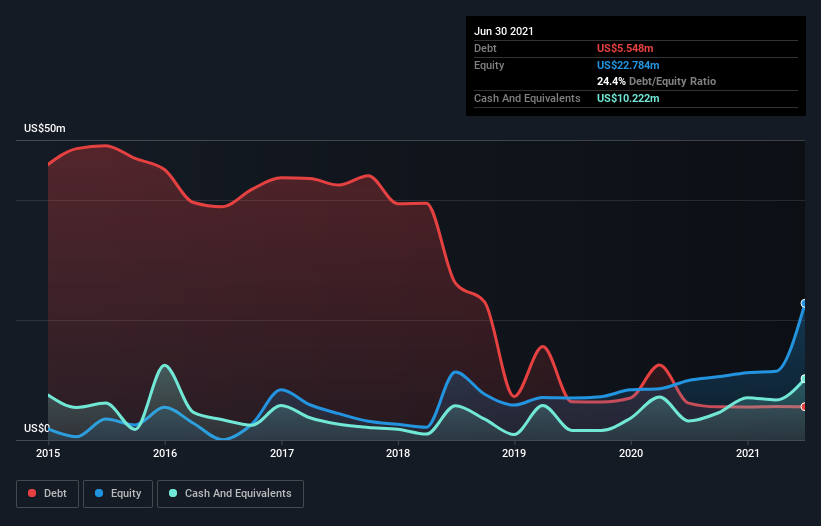We Think Comstock Holding Companies (NASDAQ:CHCI) Can Stay On Top Of Its Debt
Some say volatility, rather than debt, is the best way to think about risk as an investor, but Warren Buffett famously said that 'Volatility is far from synonymous with risk.' It's only natural to consider a company's balance sheet when you examine how risky it is, since debt is often involved when a business collapses. We can see that Comstock Holding Companies, Inc. (NASDAQ:CHCI) does use debt in its business. But is this debt a concern to shareholders?
Why Does Debt Bring Risk?
Debt assists a business until the business has trouble paying it off, either with new capital or with free cash flow. Part and parcel of capitalism is the process of 'creative destruction' where failed businesses are mercilessly liquidated by their bankers. While that is not too common, we often do see indebted companies permanently diluting shareholders because lenders force them to raise capital at a distressed price. By replacing dilution, though, debt can be an extremely good tool for businesses that need capital to invest in growth at high rates of return. The first step when considering a company's debt levels is to consider its cash and debt together.
View our latest analysis for Comstock Holding Companies
What Is Comstock Holding Companies's Debt?
You can click the graphic below for the historical numbers, but it shows that Comstock Holding Companies had US$5.55m of debt in June 2021, down from US$6.15m, one year before. However, its balance sheet shows it holds US$10.2m in cash, so it actually has US$4.67m net cash.
A Look At Comstock Holding Companies' Liabilities
The latest balance sheet data shows that Comstock Holding Companies had liabilities of US$5.02m due within a year, and liabilities of US$12.6m falling due after that. Offsetting this, it had US$10.2m in cash and US$3.06m in receivables that were due within 12 months. So its liabilities total US$4.30m more than the combination of its cash and short-term receivables.
Given Comstock Holding Companies has a market capitalization of US$39.7m, it's hard to believe these liabilities pose much threat. However, we do think it is worth keeping an eye on its balance sheet strength, as it may change over time. While it does have liabilities worth noting, Comstock Holding Companies also has more cash than debt, so we're pretty confident it can manage its debt safely.
The modesty of its debt load may become crucial for Comstock Holding Companies if management cannot prevent a repeat of the 34% cut to EBIT over the last year. Falling earnings (if the trend continues) could eventually make even modest debt quite risky. There's no doubt that we learn most about debt from the balance sheet. But you can't view debt in total isolation; since Comstock Holding Companies will need earnings to service that debt. So if you're keen to discover more about its earnings, it might be worth checking out this graph of its long term earnings trend.
Finally, while the tax-man may adore accounting profits, lenders only accept cold hard cash. Comstock Holding Companies may have net cash on the balance sheet, but it is still interesting to look at how well the business converts its earnings before interest and tax (EBIT) to free cash flow, because that will influence both its need for, and its capacity to manage debt. Happily for any shareholders, Comstock Holding Companies actually produced more free cash flow than EBIT over the last three years. That sort of strong cash conversion gets us as excited as the crowd when the beat drops at a Daft Punk concert.
Summing up
Although Comstock Holding Companies's balance sheet isn't particularly strong, due to the total liabilities, it is clearly positive to see that it has net cash of US$4.67m. And it impressed us with free cash flow of US$4.2m, being 278% of its EBIT. So we don't have any problem with Comstock Holding Companies's use of debt. The balance sheet is clearly the area to focus on when you are analysing debt. But ultimately, every company can contain risks that exist outside of the balance sheet. We've identified 4 warning signs with Comstock Holding Companies (at least 1 which makes us a bit uncomfortable) , and understanding them should be part of your investment process.
Of course, if you're the type of investor who prefers buying stocks without the burden of debt, then don't hesitate to discover our exclusive list of net cash growth stocks, today.
This article by Simply Wall St is general in nature. We provide commentary based on historical data and analyst forecasts only using an unbiased methodology and our articles are not intended to be financial advice. It does not constitute a recommendation to buy or sell any stock, and does not take account of your objectives, or your financial situation. We aim to bring you long-term focused analysis driven by fundamental data. Note that our analysis may not factor in the latest price-sensitive company announcements or qualitative material. Simply Wall St has no position in any stocks mentioned.
Have feedback on this article? Concerned about the content? Get in touch with us directly. Alternatively, email editorial-team (at) simplywallst.com.

 Yahoo Finance
Yahoo Finance 
